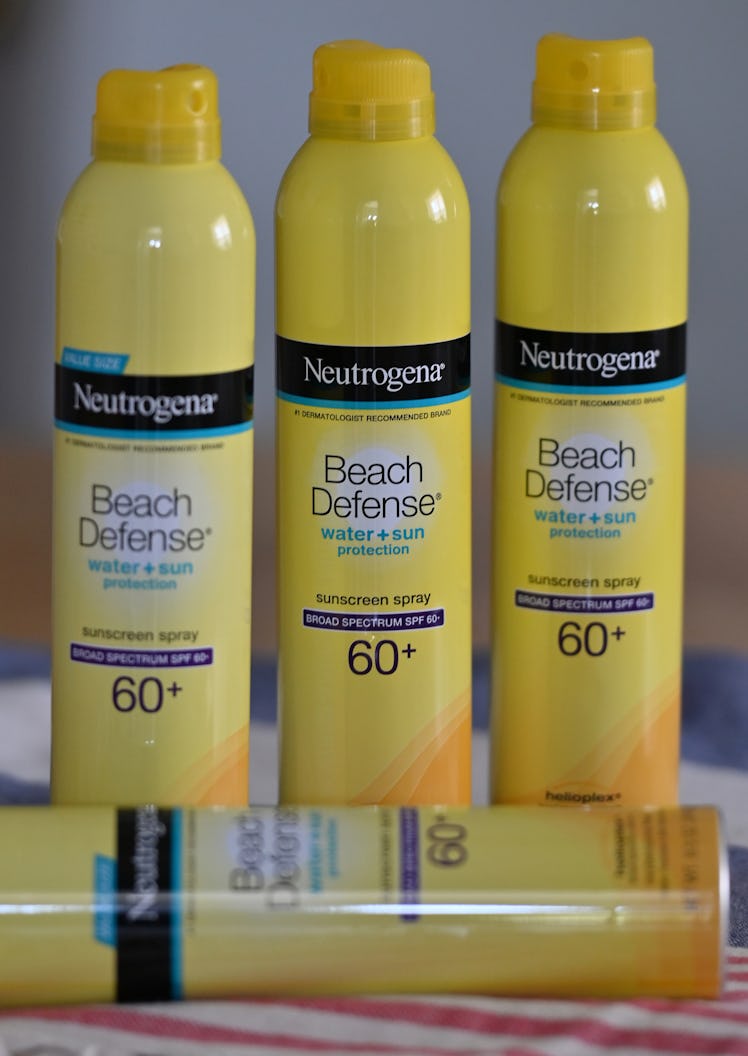
The Johnson & Johnson Sunscreen Recall Affects These 2 Popular Brands
Check your beach bag for these aerosol products.
Johnson & Johnson issued a voluntary recall of five of its aerosol sunscreen products on Wednesday, July 14 after internal testing revealed the products contained small amounts of a carcinogen called benzene. As a result, Johnson & Johnson is urging people to stop using the affected products and toss them while it conducts an investigation. Here’s which popular sunscreen products were named in the recall.
While benzene is not an ingredient in the recalled sunscreens, trace amounts of the carcinogen were found in five Neutrogena and Aveeno spray sunscreens. According to Johnson & Johnson’s July 14 press release, daily exposure to the benzene levels detected during testing “would not be expected to cause adverse health consequences.” In an emailed statement to Elite Daily, Johnson & Johnson said, “The health and safety of the people who use our products is our top priority. Our voluntary decision to remove all lots of these specific aerosol sunscreen product lines from the market is being made out of an abundance of caution.” Johnson & Johnson is currently “investing the cause of the issue,” per the release.
The recall impacted all SPF levels and sizes of the following aerosol products:
- Aveeno Protect + Refresh aerosol sunscreen
- Neutrogena Beach Defense aerosol sunscreen
- Neutrogena Cool Dry Sport aerosol sunscreen
- Neutrogena Invisible Daily defense aerosol sunscreen
- Neutrogena Ultra Sheer aerosol sunscreen
These products are no longer available to purchase, but if you already have one, Johnson & Johnson urged consumers to throw it out and get a refund. If you have any issues related to using the recalled products, Johnson & Johnson suggested contacting your physician and reporting adverse reactions to the Food and Drug Administration (FDA)'s MedWatch Adverse Event Reporting program either online or at 1-800-332-1088.
In a July 15 email to Elite Daily, Johnson & Johnson emphasized that the rest of Neutrogena and Aveeno’s sun care portfolio, including lotions, sticks and face mist sunscreens, and sunless tanning products, was not impacted and continues to be available to consumers. In addition, Neutrogena Wet Skin aerosol sunscreen was not impacted by the recall.
Johnson & Johnson’s recall comes shortly after a May 2021 study by a pharmacy called Valisure found 78 sunscreens and after-sun products with some level of benzene contamination. According to the Centers for Disease Control and Prevention (CDC), regular exposure to benzene at even low levels has been linked to blood cancers such as leukemia, excessive bleeding, and a decrease in the number of red blood cells.
According to a June 2017 FDA guidance list, benzene “should not be employed in the manufacture of drug substances, excipients, and drug products because of their unacceptable toxicity.” However, in circumstances where it is unavoidable, the FDA restricts the levels of the substance to 2 ppm (parts per million).
In some cases, the Valisure data found that some batches contained up to three times that amount. A Consumer Lab report analyzing the Valisure data found that some levels of benzene had been found in 43 out of 224 sunscreens and in 8 of 48 after-sun products that were independently tested. In addition to aerosols, Valisure found that some lotions, creams, and gels were also affected. For a full list of affected sunscreen and after-sun products, you can check out Valisure’s findings.
Valisure emphasized in its study that many of the tested sunscreen and after-sun care products did not contain detectable levels of benzene (none in 217 batches from 66 brands). You can see a full list of those sunscreens here. The pharmacy also emphasized that people should still continue to use sunscreen to practice sun protection and minimize risk of skin cancer.
This article was originally published on